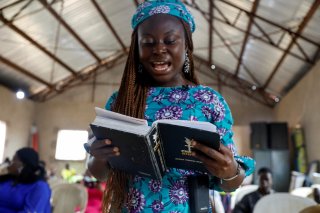Stop Trashing Relations Between Nigeria’s Christians and Muslims
It is too easy to pin a religious tag on a conflict in a developing country, and for outsiders to rush to the cause of one or the other. But you only have to visit another area in Nigeria without conflict, and its complex causes, to find its refutation.
We are two faith leaders—a Christian pastor and a Muslim imam—from Nigeria, one of the most culturally diverse nations in the world.
In our country of more than 200 million, and where religion is important to the daily lives of almost all, it is unexceptional to find those of both faiths living in harmony in the same ethnic groups, the same local communities, and even praying in the same family homes.
So, it is hard to be told by some from beyond our borders that this is in fact an exception; that Nigeria Is a land of extreme tensions between the Abrahamic faiths, the two great religions on the brink of war and cannot live side by side. Some claim that Christians are persecuting Muslims; others that Muslims are persecuting Christians. But from foreign NGOs and pressure groups—the leaders of which have doubtless never visited our country—we mostly learn we possess a government biased towards Islam, and that Christians in our lands are treated as second-class citizens.
This is not how we see it or experience it. And because it is not, we are obliged to speak out.
The state of religious dialogue is far from perfect in Nigeria. But it is far from being so anywhere: attacks against synagogues in the United States and teachers in France, unfortunately, attest to this. Yet to suggest that Nigeria represents the extremity of tensions is untrue. In many regards, it is where there is equilibrium between faiths.
That is most obvious in governance: a conservative Muslim president and an evangelical Christian pastor vice president oversee a cabinet whose members are equally weighted between Christianity and Islam.
But this doesn’t stop the accusations from outside onlookers. It would seem preposterous to suggest the government is indifferent to Boko Haram’s menace. Instead, they fixate on so-called herder-farmer clashes to argue there is a directed campaign of persecution against the nation’s Christians.
Yet it has been the case for centuries that nomadic herders have grazed cattle across the whole of the Sahel, travelling routes from Mali to Nigeria. This has led to disputes with arable farmers, sporadically, and over hundreds of years. But in recent decades, clashes have grown more frequent.
A confluence of climate change, population growth, and the Boko Haram insurgency in the Northeast of Nigeria has pushed herders further south—into the country’s Middle Belt Breadbasket—in search of water and grazing pastures. Here, disputes with farmers, whose own numbers and need for land has grown exponentially in recent decades, can lead to violence and fatalities. But for outside commentators, this fact of land competition has been ignored. Instead, the incidental detail that many herders are Muslim, whilst many farmers are Christians (though this fault line is not nearly as clear as reported) is the only “fact” that matters.
Also ignored is the government’s plan to modernize the livestock sector and resolve the competing demands of herders and farmers. The proposed cattle ranches would curb the movement of animals—with obvious implications for reducing friction with farmers. The International Crisis Group has called it the most comprehensive plan to date. But it has been hampered by insufficient buy-in by both herders and farmers. Many believe it will favor one at the expense of the other and misconceptions proliferate over the policy.
Outside groups—by driving the idea of religious motivation in clashes—only deepen the mistrust and reinforce a perception of division. Whilst this affects the plan’s uptake, it also ratchets tension in affected areas, where waves of retribution have left many communities insecure. Under such stresses, accidents become more likely—often setting off further cycles of reprisal.
For some of these outside groups, they do this unwittingly—driven by genuine concern for religious denominations across national borders. But for others, it is their principal aim: a wish to drive a wedge between Nigerians for personal or political gain. It is effective precisely because they can pray on the concern of others abroad to take up the cause, without understanding the complex characteristics in play within Nigeria.
Nowhere is this more evident than the case of Indigenous People of Biafra—a designated terrorist group that pursues the secession of Southeastern Nigeria. They have paid millions of dollars to unscrupulous U.S. lobbying companies to paint a picture of a country falling apart along religious lines to reinforce the idea that the solution lies in the breakup of our federal nation, and make their violence—which we in Nigeria see as terrorism—more palatable to international audiences.
Unfortunately, it is too easy to pin a religious tag on a conflict in a developing country, and for outsiders to rush to the cause of one or the other. But you only have to visit another area in Nigeria without conflict, and its complex causes, to find its refutation. Lagos is a twenty-five-million-strong city, a melting pot of multiculturalism and multi-faith communities. There, Muslims and Christians live together—worshipping side-by-side in peace and grace.
When this is seen, it becomes difficult to say there is a problem between religions in Nigeria. We implore groups to witness this before sounding the alarm of religious division—and look closer at how easily unity can be and is found across our Abrahamic faiths.
Reverend Yakubu Pam is Executive Secretary of the Nigerian Christian Pilgrim Commission.
Sheikh Imam Tajudeen is Chief Imam of the Prince and Princesses Jumaat Mosque, Abuja.
Image: Reuters.

